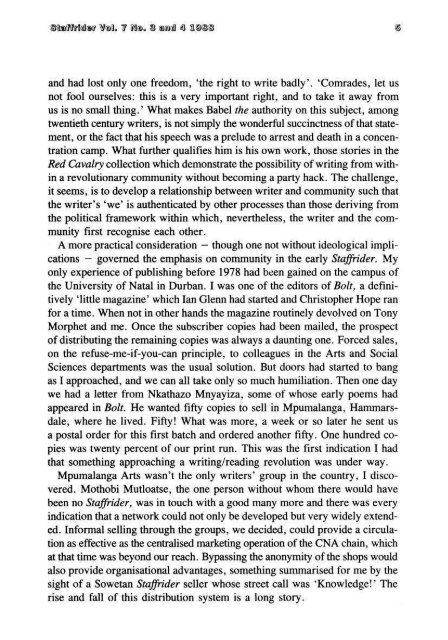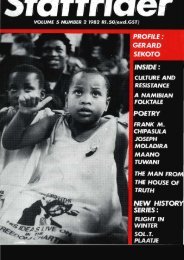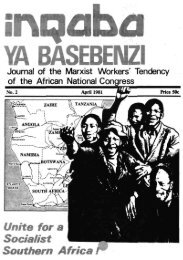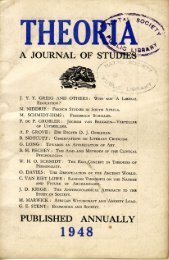- Page 1 and 2: TEN YEARS •:,§§I§f'-' 1978-198
- Page 3 and 4: © The contributors as listed on th
- Page 5 and 6: Contents Preface A.W. Oliphantllv'a
- Page 7 and 8: Time Has Run Out Mongane Serote 223
- Page 9 and 10: Preface Staffrider magazine, which
- Page 11 and 12: part in the development of document
- Page 13 and 14: etween these writers, their communi
- Page 15 and 16: § StafflfrMw w®a, i m. § ®®& 4
- Page 17: 4 StaifflMlw Won. ? Kl®. $ fimd 4}
- Page 21 and 22: I StafflrMtar MD». 1 K)®a U DODGD
- Page 23 and 24: SWWIFIMW Ws>Qa 1 M®» § m
- Page 25 and 26: StatfMtoir W®L 1 M®» % mmd 4 aD$
- Page 27 and 28: §&i»3(ia®(? W®Q. 1 M®* $ mm®
- Page 29 and 30: §tarffflril
- Page 31 and 32: StarfifrMoir WDB. 1 Kl®. S mm® 4
- Page 33 and 34: SttaffflrlMw W®L 1 M®» $ aori) 4
- Page 35 and 36: StatiMftw W®L 1 M®» S mm® 4 ED
- Page 37 and 38: SMMdi]®!? W®Q» 1 K)®a % ®M 4 E
- Page 39 and 40: iftaffiorBaD®!? W®L 1 Kl®0 S mm
- Page 41 and 42: &WNMmt WDII. 1 M®, S annoQ 4 21D©
- Page 43 and 44: §tafflfrB
- Page 45 and 46: §ttafflfrO
- Page 47 and 48: SMMto W®Ua 1 M®» 3 mm® 4 HD§©
- Page 49 and 50: $faritftrll
- Page 51 and 52: StatfMDw W®L ? Nl®« S mm® 4 ED
- Page 53 and 54: StatfMflw W®L ? M®. 1 amtfl 4} ED
- Page 55 and 56: i$at?f?(?y©!? WDfli 1 M®« S ®w&
- Page 57 and 58: StatfMtoor WPD. 1 Kl®a $ ®m
- Page 59 and 60: StofflMdw Wl. 1 M®» $ ®m® 4 HD
- Page 61 and 62: §feaM(tar WDB. 1 m®. $ ttiKd 4 HD
- Page 63 and 64: S«?o^@[? Wd>Qa 1 K)®» $ anri) 4
- Page 65 and 66: §t*af?(?(?a(a©(? Wall. 1 KI®, S
- Page 67 and 68: 9WMQM Wt. 1 M®* 1 mM 4 aD§§ ii b
- Page 69 and 70:
WMMM WDH. 1 M®, § OOMD 4} ED©§
- Page 71 and 72:
§taM#sir WDII. H M®a S airofl 4
- Page 73 and 74:
MnlNlrMtar W®], 1 K)®» a m® 4 &
- Page 75 and 76:
§«M
- Page 77 and 78:
StafflMqDw V*0. f M®. $ s^dO 4} &D
- Page 79 and 80:
t«M(to V
- Page 81 and 82:
§Sa»9(iil®tf V*Q. 1 M®. 3 amoD
- Page 83 and 84:
§M?M®(7 WDD. ? M®« 8 snKd 4 &D
- Page 85 and 86:
^aM^dtf Vol). 1 m®. U m® 4 aD©§
- Page 87 and 88:
s$®»9(fc voo. i m®* s ao^ 4 HDS
- Page 89 and 90:
§««®i? WDO. i w®* i m® 4 aD©
- Page 91 and 92:
Staffllrltatoir VM. 1 M®a S wx& 4
- Page 93 and 94:
§ftatffli?ll
- Page 95 and 96:
§MM$©[? W®a» 1 Kl®, S mm® ®
- Page 97 and 98:
Staffflrlkdw Vol), f M®, S amd 4 &
- Page 99 and 100:
S$®{ffi?y®Gr WDQ. 1 M®a. S aofix
- Page 101 and 102:
iSaMtoi? V®D. 1 M®» a amd 4 aD§
- Page 103 and 104:
§MffflrO#s
- Page 105 and 106:
Staffflrlfcdw V®B. 1 M®, 1 awd 4
- Page 107 and 108:
StaMirlMMr ^/®fla 1 Kl®, $ aiMl 4
- Page 109 and 110:
§««
- Page 111 and 112:
^®»8^®i? V®B. ? K)®» i awfl 4
- Page 113 and 114:
@ta(fflrll#w Wall. 1 M®> 3 mud 4 a
- Page 115 and 116:
StofflMw WDO. f M®» § and 4 aD§
- Page 117 and 118:
mmm®v W®L i m®» $ ®m® $ aD©
- Page 119 and 120:
SfatfiMkftiir MDIL 1 M®a U ®m& 4
- Page 121 and 122:
§ftaMfl
- Page 123 and 124:
§«Mte W®L 1 Kl®, 3 9M& ® ai)©
- Page 125 and 126:
StafflfrDdiw w®u. f m®» § MMD 4
- Page 127 and 128:
§tatfMDw M®IL f KI®» u ®o^ 4 a
- Page 129 and 130:
^SaiMtotF ^/©a, 1 Kl®, § ®m
- Page 131 and 132:
Kta flFfl nearly lost my job. About
- Page 133 and 134:
!Mffi!/»ay W®L 1 Kl®,•% ms& 4
- Page 135 and 136:
§$®fiora(0®!? WDQ. a m®» §®w
- Page 137 and 138:
§ite)»5(D. 1 M®* a mm® 4 aD©§
- Page 139 and 140:
I M f M ^ W®L f Kl®, § m
- Page 141 and 142:
sMfrOtiw ^»a i KI®, i arodi ^ aD
- Page 143 and 144:
iMMter MDO. H Kl®a 1 D@$ 4 11D©©
- Page 145 and 146:
StatfMOw Ms>IL 1 M®-1 mM 4 aD§©
- Page 147 and 148:
§Sffltffii?B
- Page 149 and 150:
WWNMto WDII. 1 mm. $ ®m® 4 aD§§
- Page 151 and 152:
IftsitMGfl®!? W®h 1 M®. S m® 4
- Page 153 and 154:
§tMM$©(? WDB. 1 Kl®. IS ®(M) 4
- Page 155 and 156:
SttaffMQw W®Oa 1 M®, S mm® 4 aD
- Page 157 and 158:
StofFMQw Ma>H. f m» 1 mm® 4} ED§
- Page 159 and 160:
a$afl?GrB(gl®[? W®L 1 Kl®0 8 u(f
- Page 161 and 162:
SMfflrlkflwr W®L 1 m®» 3 mM 4 aD
- Page 163 and 164:
§$D»3(te mL f KJ®a 1 ®m® 4) aD
- Page 165 and 166:
§M?t?y3(to W®L 1 M®a U wM ® HD
- Page 167 and 168:
SMfMto WDB. f Kl®a S ®ffii^ 4) ED
- Page 169 and 170:
SMMto W®L i IN®, n «HKK3Q 4 aD§
- Page 171 and 172:
§&D»3to W®L i Ki®a u m
- Page 173 and 174:
StUtfMfflnr W®L H m®» $ mmd ® I
- Page 175 and 176:
2(g4 ^MMto W®L 1 m» n amd 4 aD«
- Page 177:
Mark Lavender
- Page 180 and 181:
Ralph Ndawo
- Page 182 and 183:
Biddy Partridge Reiger Park -£•
- Page 184 and 185:
Karl Sansom District Six
- Page 186 and 187:
David Goldblatt Soweto: Coalminer a
- Page 188 and 189:
•I Paul Weinberg Students on the
- Page 190 and 191:
Cedric Nunn Inyoni, Zululand: Woman
- Page 192 and 193:
®W?f?i?fl
- Page 194 and 195:
StaffiMkflw WDO. 1 M®« $ asadO 4
- Page 196 and 197:
§tfc®M$®Gr WDfl, 1 K)®a § m®
- Page 198 and 199:
1 W®» § &M 4 a§@© a?a Story Sp
- Page 200 and 201:
a?4 §(MM)
- Page 202 and 203:
are VMtoMm Wl. 1 mm. § mm® 4} aD
- Page 204 and 205:
are it's only your imagination it's
- Page 206 and 207:
a©® mmmm WDO. i mm. a m
- Page 208 and 209:
a§g SMfflriMw wi. f KI®» $ ^QD^)
- Page 210 and 211:
a®4 SMfflriMMT WDII. 1 KI®a § ^Q
- Page 212 and 213:
a©(§ StatfMtar WDII. f ^®a 3 ®M
- Page 214 and 215:
%m The Reason The reason why murder
- Page 216 and 217:
HD® §$afflGra
- Page 218 and 219:
ED^ §Sariffii?ll(a®iy W®L 1 M®a
- Page 220 and 221:
aD4 Giovanni Jacopo Meditates (on h
- Page 222 and 223:
aD® §terffflorfl#si? W®L 1 m»
- Page 224 and 225:
ED§ ftn»3(te W®L 1 IN®. S uo^]
- Page 226 and 227:
Booked, listed and particulars take
- Page 228 and 229:
i®^ On Top of the Magalies For Nap
- Page 230 and 231:
i®4 SfaitfMw Ws>Q. 1 Kl®» $ ®W(
- Page 232 and 233:
What Is Death? Mother, what is deat
- Page 234 and 235:
g®§ i KI®. i ®^ 4 a§§§ The s
- Page 236 and 237:
ga® defying the corrupt little gia
- Page 238 and 239:
§32 StarffflMsir V
- Page 240 and 241:
%m The Local Games Fog is turning e
- Page 242 and 243:
%n® SfatifaMmt WD«. 1 KJd>a 1 mm
- Page 244 and 245:
^m Possibilities for a Man Hunted b
- Page 246 and 247:
f*g® i^ff?i^)®y W®L f »» s D@$
- Page 248 and 249:
Mzwakhe Nhlabatsi Mongane Serote §
- Page 250 and 251:
%m mmmm W®L ? m®> s ®m
- Page 252 and 253:
%m wheel kept spinning, slowly at f
- Page 254 and 255:
&m Bloody Tears on Mzimhlophe Statf
- Page 256 and 257:
%m mmmmm w®3» i m* a wv& 4 ILDTO
- Page 258 and 259:
%m ^mflivMw W®L 1 M®. U m® ® aD
- Page 260 and 261:
3$4 §tariffl?ii(a®f? W®L i KI®
- Page 262 and 263:
2$
- Page 264 and 265:
it® a$affii?Bdl®(? MsB. 1 IKI®,
- Page 266 and 267:
g4}(D SWfflirlWtoir. WB>». 1 M®»
- Page 268 and 269:
m% i followed this man, asking for
- Page 270 and 271:
144 IMPfFGrl^or MDU. 1 K)®a U ®D$
- Page 273 and 274:
StaiffllrlMw W®h f Kl®a 3 uaadO 4
- Page 275 and 276:
SM^O^Gr Ws>(L 1 M®» U aintf) 4) I
- Page 277 and 278:
itMiMto w®iL i m®. s ®w& 4 aD©
- Page 279 and 280:
StaffiMwr W®L 1 K)®» 1* small 4
- Page 281 and 282:
S&uMto W®L If Kl®» S ®m® 4 &m
- Page 283 and 284:
l&afM^Gr WL 1 Mm. a m® 4 ED©© mi
- Page 285 and 286:
SftDMto WL f ^l®a li ®m
- Page 287 and 288:
9M9mw W®L 1 m®» S mm® 4 ED©©
- Page 289 and 290:
swwiiteff vw. a Ki®, % ®m® 4 %m&
- Page 291 and 292:
§«fay©(? W®L 1 W®, t ®m
- Page 293 and 294:
sttaftfriMw ^/©a, i M®- a ®m® 4
- Page 295 and 296:
§&at?tfaa(te ^/®!L 1 Kl®. U ®m$
- Page 297 and 298:
StaM#wr WDD. 1 m» 1 mM 4 Wm Jazz (
- Page 299 and 300:
StaMrMtar ¥®0. H M®» % ®m& ®>
- Page 301 and 302:
©ftaflfattdtei? Wh 1 M®, § mm®
- Page 303 and 304:
'nMMw W®L f M®» n ®m
- Page 305 and 306:
§$afl?(?B
- Page 307 and 308:
SttatFMffliGr WDIL 1 K)®a S acfi)(
- Page 309 and 310:
ttatfflrlMw WDII. f m®. i skUDOfl
- Page 311 and 312:
§«?Gr8$©(? W®h 1 K)®a S ®m
- Page 313 and 314:
§MM(te ^®Oa f K)®» S mm® 4 aD
- Page 315 and 316:
ifoaiMtoGr Vol), f M®. $ ®m
- Page 317 and 318:
SftaifflriaDw W®a» 1 M®» 8 ao^
- Page 319 and 320:
StafflrlMw W®L 1 mm. M ®m
- Page 321 and 322:
Staffflrlkdw W®L ? KJ®a 3 m® 4
- Page 323 and 324:
!D© dfaKffiMMw W®h 1 K)®» S ®U
- Page 325 and 326:
U®D SMMfci? ^/®Oa TM®9 U swooD 4
- Page 327 and 328:
1®L f Kl®a © »m(fl 4 aD©§ and
- Page 329 and 330:
u®^ StatfMftwr WD». 1 m* $ audi 4
- Page 331 and 332:
a®® StatfMfflftir WDH. 1 M®» i
- Page 333 and 334:
s®§ dtafflrlkdw WDO. f K)®a §
- Page 335 and 336:
Sa® §tatfMftti? W®L 1 m®» $ mm
- Page 337 and 338:
m% Staffltolktiw V0B. f Nto. ® and
- Page 339 and 340:
m® SfariNMaOw W®L 1 K)©» § aaa
- Page 341 and 342:
aa® StarfMfttor Vol), f KJ®» $ s
- Page 343 and 344:
sa© i M®a s ^ffii^ 4 ED§© Sam N
- Page 345 and 346:
S^D starfrffrMw wi. i m®a u m
- Page 347 and 348:
S2g ^««®Gr Vol). ? Kl®a $ SUM*)
- Page 349 and 350:
m® StatffMlw W®[]a ^ Kld)a § SMJ
- Page 351 and 352:
si® §ftaifflrlM
- Page 353 and 354:
\m ^kmffiMm WD]. ? JO®, S mM 4 &®
- Page 355 and 356:
m® SWIMQw W®L 1 K)®a U D^ 4} aD
- Page 357 and 358:
asg §MMd
- Page 359 and 360:
SU4 iftstffaate W®L 1 M®, % m® 4
- Page 361 and 362:
as® StaWirNiw ww. i mm. a m® 4 a
- Page 363 and 364:
as© §Mffirfl
- Page 365 and 366:
S4® StartftoMw W®L 1 K)®» 3 QOM
- Page 367 and 368:
^4}g ^a»B(a©[? VM. ^ Kl®, i am(a
- Page 369 and 370:
S44 statftMkftMr w®a. i mm. % aiBd
- Page 371 and 372:
m® SttaWMftor W®L 1 m®. $ mm® 4
- Page 373 and 374:
X^:^ Fikile Observer : ^ i ^ ''"NNi
- Page 375 and 376:
StatfMtiw WDB. 1 K)®a $ atsri) 4 a
- Page 377 and 378:
S&aMsOoB' MsO, 1 m®» 3 mM Q ED©
- Page 379 and 380:
StatfMffliir W®IL 1 m®» § ®m®
- Page 381 and 382:
StatfMflw W®L i m>. % ®m& 4 a§®
- Page 383 and 384:
IfoaMte W®h 1 M®, $ m® 4J SD§©
- Page 385 and 386:
§&a»9(te Wh 1 Kl(Da U ®m@ 4 &D§
- Page 387 and 388:
9MM&W W®L f K)®a 3 SDRKd 4 21D©
- Page 389 and 390:
StaffioMiir WA 1 M®» 3 aiEKti) ^
- Page 391 and 392:
MM$d>G? WDB. 1 M®» $ ®®(& 4 ED
- Page 393 and 394:
StUMrB(d(ftir MDO. f K)®a S MMD 4
- Page 395 and 396:
Ktaffiorfldtoor MDD. f M®. 3 amd)
- Page 397 and 398:
SMMtiw ^»a 1 m®» $ ®m® 4 aD©
- Page 399 and 400:
^ttafc w®aa i m®» i ®M 4 HD©©
- Page 401 and 402:
S^fMfc' W®L 1 M®a U m
- Page 403 and 404:
iftatM^ Wall. 1 M®, § aGfodD 4 aD
- Page 405 and 406:
SSaMtot? W®(L 1 M®« 8 mm® 4 IID
- Page 407 and 408:
i ^ t M ^ W®L 1 K)a t SNft$ 4 &D©
- Page 409 and 410:
StaMMw mh f m®» § amti) 4 ED©§
- Page 411 and 412:
S&a»3(te WL 1 m®» M mm® 4 &®m
- Page 413 and 414:
SD® ©ftaffiiFllGll®!? W®L 1 K)
- Page 415 and 416:
SD1 StatfMfflwr W®L 1 M®* I r t 4
- Page 417 and 418:
SD4 SttafflMMw Vtl. f Mm. $ m
- Page 419 and 420:
8D® Reluctant neighbour (P) 6.4.87
- Page 421 and 422:
SD© §tarfffltrB#»(r W®L 1 KJ®a
- Page 423 and 424:
^®(D ^ » 3 ( t e W®3, 1 M®a §
- Page 425 and 426:
4}®1 StotfflrlMw V®0. 1 M®. $ um
- Page 427 and 428:
4®4 StoffioriMw w®L i K)®» $ m
- Page 429 and 430:
4D® ftDtrfag^ w®aa ? Md)a n m® 4
- Page 431 and 432:
4®§ MKMMMr ^»a 1 m* $ smoQ
- Page 433 and 434:
Garth Erasmus
- Page 435:
RIDING STAFF IN THIS ISSUE: ABRAHAM
















